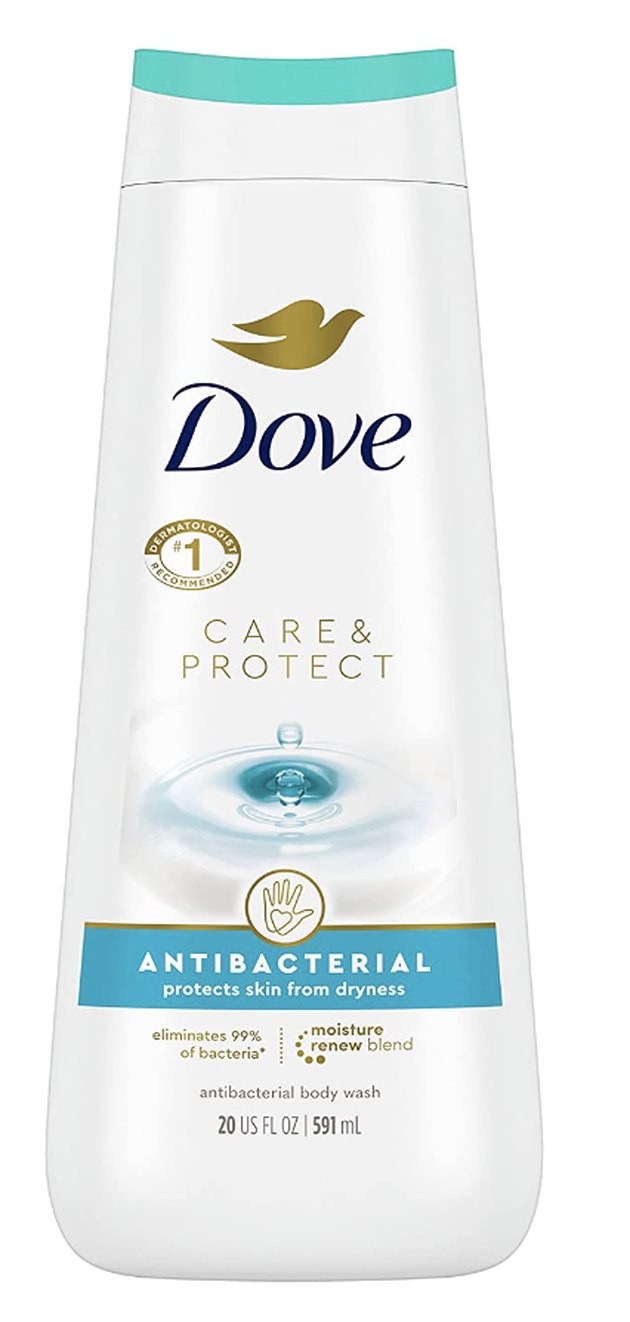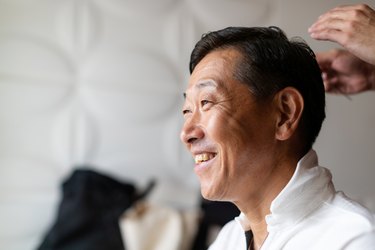
Your body changes as you get older — that's a fact. But age-related shifts don't just have to do with the way you look and feel. They can also affect how you smell.
"Studies have indicated that our natural odor changes as we get older. The changes are often subtle and not necessarily stark enough to become noticeable unless one has a keen sense of smell," says Carlos Galindo, MD, a family medicine practitioner with Texas Health Presbyterian Hospital Plano.
Video of the Day
Video of the Day
Some people may refer to this as "old people smell," but it's totally normal and nothing to worry about — and it happens to us all. It's actually called nonenal odor, and it's just one more part of the aging process.
With healthy hygiene and lifestyle habits, though, nonenal odor usually isn't all that noticeable.
Here's why it happens (to the best of our knowledge) and what you can do about it if it bothers you.
Why Your Body Odor Changes With Age
So what is it exactly that can make a person smell different when they get older?
The way skin smells has to do with interactions between skin gland secretions (like sweat) and bacteria on the skin. As we age, both our skin's secretions and bacteria tend to change, resulting in a slight difference in body odor, Dr. Galindo says.
The smell, which some people describe as slightly musty, has been identified by odor scientists as 2-nonenal. Detected exclusively in adults over 40, it can occur when degraded unsaturated fatty acids and oxidated lipids form on the skin, per a landmark April 2001 study in the Journal of Investigative Dermatology.
This slight shift in body odor is a normal, natural part of the aging process. But other things can also factor in. The hormonal shifts that occur during menopause, for instance, can trigger hot flashes that cause an increase in sweating, which can make body odor more noticeable.
Medical conditions that become more common with age — like diabetes, gout, liver disease or kidney disease — can also lead to changes in the way a person smells, according to the Cleveland Clinic.
A slight uptick in mustiness isn't always noticeable or problematic. In fact, people tend to rate the scents of older adults as less intense and less unpleasant than the scents of their younger counterparts, reported one May 2012 study in PLOS One.
Nonenal odor also isn't something that becomes more noticeable when you sweat, Dr. Galindo notes.
In other words? There isn't a whole lot you can do to change your natural scent. And most people probably aren't noticing it anyway.
That said, poor hygiene and certain lifestyle habits can make a person's body odor stronger or unpleasant, Dr. Galindo says. Per the Cleveland Clinic and Dr. Galindo, here are some ways you can smell your best:
1. Shower or Bathe Regularly — but Don't Overdo It
Unwanted body smells can happen when sweat — which is initially odorless — mixes with bacteria on the surface of the skin. Washing regularly with soap can keep skin bacteria from building up, so there's less smell when you sweat.
An antibacterial soap, such as Dove Care and Protect Antibacterial Body Wash, will do the best job at washing stinky bugs away.
You may not need to bathe every day, though. Older adults are prone to dry skin, according to the National Institute on Aging (NIA), and bathing with harsh soaps and/or hot water can make it worse.
Aim to bathe a few times a week, but when you do, make the water temperature warm (not hot), keep showers short and apply skin lotions or creams afterward to lock in moisture, per the NIA.
2. Swipe on an Antiperspirant
Antiperspirants work by temporarily blocking the body's sweat glands to stop sweating, so sweat doesn't mix with bacteria and produce a smell. (That's different from a deodorant, which masks odors but doesn't stop sweating.)
If you're a heavy sweater, try a prescription-strength, over-the-counter option like Certain Dri Prescription Strength Clinical Antiperspirant.
3. Pay Attention to What You Eat
Foods like onion, garlic, cabbage, broccoli, cauliflower, red meat, alcohol and ones with spice can all potentially make sweat smell worse.
On the other hand, a diet rich in fruits and vegetables and low in saturated fat can help maintain the health of your skin, promoting healthier bacteria levels that can help keep odor in check, Dr. Galindo says.
4. Exercise Regularly
Sure, you might break a sweat while you're working out. But regular physical activity is another thing that can support healthy skin bacteria, Dr. Galindo says.
5. Keep Your Stress in Check
Make sure to find ways to regularly relieve stress. Stress can activate your sweat glands and intensify body odor.
Try a few round of deep breathing exercises, stretching, brisk walking, playing soothing music or even watching a show that makes you laugh. Done regularly, these methods can all help lower your stress, according to Harvard Health Publishing.
When to See a Doctor About Body Odor Changes
Slight shifts in body odor are a normal part of aging. But sometimes a new smell can be a sign of a possible health problem, like liver or kidney issues, or metabolic problems, like a thyroid disorder or diabetes, per the Cleveland Clinic.
"Always check with your personal physician if an odor concerns you or seems to be pungent in nature," Dr. Galindo says. The same applies to odor changes of your urine or breath.
- Journal of Investigative Dermatology: "2-Nonenal newly found in human body odor tends to increase with aging"
- Cleveland Clinic: "Body Odor"
- PLOS One: "The Smell of Age: Perception and Discrimination of Body Odors of Different Ages"
- Harvard Health Publishing: "Top Ways to Reduce Daily Stress"
- National Institute on Aging: "Skin Care and Aging"
Is this an emergency? If you are experiencing serious medical symptoms, please see the National Library of Medicine’s list of signs you need emergency medical attention or call 911.




